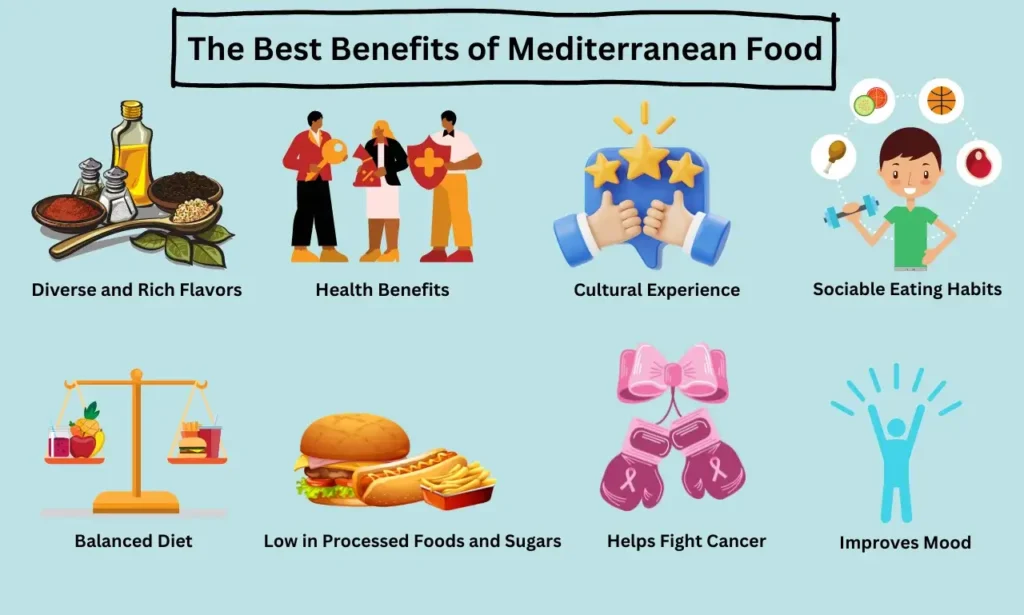If you’re looking to improve your health through food, Mediterranean cuisine offers an appealing, tasty, and nutritious way to do it. This diet, filled with fresh produce, healthy fats, and lean proteins, is known for its numerous health benefits. In this blog, we’ll explore why Mediterranean cuisine is so beneficial, how it supports heart health, and how it can help with weight management.
The health benefits of Mediterranean cuisine are vast, particularly for heart health and weight management. This diet is rich in healthy fats, fresh produce, and fish, making it a powerhouse of nutrients. It’s not only a great choice for maintaining a healthy weight but also plays a major role in reducing inflammation and improving overall health. Whether you’re new to Mediterranean food or an experienced enthusiast, it’s easy to incorporate into your life with simple steps. Let’s take a closer look!
Why the Mediterranean Diet Is One of the Healthiest Choices
Mediterranean cuisine has earned a stellar reputation for its health benefits. Often associated with countries like Greece, Italy, and Spain, this diet focuses on fresh, whole foods that promote longevity and overall well-being. What makes it so healthy is its emphasis on natural ingredients, including fruits, vegetables, whole grains, and lean proteins.
One of the key elements of the Mediterranean diet is its focus on plant-based foods. Vegetables, legumes, and grains form the foundation of many meals, providing an abundance of vitamins, minerals, and fiber. The diet also includes moderate amounts of fish and poultry, but the spotlight is on fresh, unprocessed ingredients.
A key component of Mediterranean cuisine is olive oil, which is rich in monounsaturated fats. These healthy fats help reduce bad cholesterol levels and improve heart health, making the diet a heart-healthy choice.
Top Health Benefits of Olive Oil, Fish, and Fresh Produce
Olive oil, fish, and fresh produce are staples in Mediterranean cuisine. Let’s break down the health benefits of these foods:
- Olive Oil: The Mediterranean diet relies heavily on olive oil as the primary source of fat. Olive oil is packed with healthy monounsaturated fats, which can lower bad cholesterol levels and reduce the risk of heart disease. Additionally, olive oil contains antioxidants that fight inflammation, making it one of the best anti-inflammatory foods Mediterranean cuisine offers.
- Fish: Fish, especially fatty fish like salmon, mackerel, and sardines, are rich in omega-3 fatty acids. These healthy fats support heart health by reducing inflammation and improving blood circulation. Omega-3s also have the added benefit of supporting brain health, reducing the risk of cognitive decline as we age.
- Fresh Produce: Vegetables, fruits, and legumes form the backbone of Mediterranean meals. These foods are loaded with fiber, vitamins, and minerals that help improve digestion, boost the immune system, and reduce inflammation. A diet rich in fresh produce can help you maintain a healthy weight and lower your risk of chronic diseases like cancer and diabetes.
How Mediterranean Cuisine Supports Heart Health
One of the most well-known benefits of the Mediterranean diet is its positive impact on heart health. Research has shown that this diet can reduce the risk of heart disease, lower blood pressure, and improve cholesterol levels. The combination of healthy fats from olive oil, the abundance of vegetables and fruits, and the inclusion of fish with omega-3s makes Mediterranean cuisine a heart-healthy powerhouse.
In addition to these benefits, Mediterranean food is rich in antioxidants, which help prevent oxidative stress. This is important for preventing the buildup of plaque in arteries and reducing the risk of heart attacks and strokes. By focusing on whole, unprocessed foods and healthy fats, Mediterranean cuisine is a great way to maintain a healthy heart.
Mediterranean Diet and Its Role in Weight Management
Many people turn to Mediterranean food for its role in weight management. The diet emphasizes whole foods that are nutrient-dense and satisfying. This makes it easier to control hunger and avoid overeating. The combination of healthy fats, fiber-rich vegetables, and lean proteins keeps you full longer, making it a great choice for those looking to maintain or lose weight.
In addition, Mediterranean food is not about restrictive dieting; it’s about eating delicious, balanced meals that nourish your body. Unlike fad diets, the Mediterranean diet is sustainable and promotes healthy, gradual weight loss.
If you’re considering Mediterranean food and weight loss, the key is moderation. The diet includes healthy fats, but it’s important to consume them in balanced portions. Similarly, fish and poultry are enjoyed in moderate amounts, with the majority of meals centered around plant-based foods.
Daily Mediterranean Diet Plan for Beginners
For those new to the Mediterranean diet, starting simple is key. Here’s a basic daily meal plan to get you started:
- Breakfast: Greek yogurt with fresh fruit, a drizzle of honey, and a sprinkle of nuts or seeds.
- Lunch: A salad with mixed greens, tomatoes, cucumbers, olives, and grilled chicken or fish, topped with olive oil and lemon juice.
- Snack: Fresh fruit, a handful of almonds, or hummus with vegetables.
- Dinner: Grilled fish, roasted vegetables, and a side of quinoa or whole-grain bread.
This plan focuses on whole foods and incorporates a good balance of healthy fats, lean proteins, and fresh vegetables. You can easily adjust portion sizes depending on your activity level and personal preferences.
Mediterranean vs. Western Diet: What’s the Difference?
The Mediterranean diet is often compared to the Western diet, which is typically high in processed foods, red meat, and sugary snacks. The main difference lies in the types of food consumed. Mediterranean cuisine emphasizes fresh, plant-based foods, lean proteins like fish and poultry, and healthy fats like olive oil. In contrast, the Western diet is heavy on processed foods that are often high in unhealthy fats, sugars, and refined grains.
The Western diet has been linked to a range of chronic health issues, including obesity, heart disease, and diabetes. On the other hand, the Mediterranean diet has been shown to reduce the risk of these conditions by promoting a more balanced, nutrient-rich approach to eating.
Conclusion
The health benefits of Mediterranean cuisine are undeniable. By focusing on fresh produce, healthy fats, and lean proteins, the Mediterranean diet supports heart health, aids in weight management, and offers a variety of other health benefits. Whether you’re a beginner or an experienced Mediterranean food lover, this diet is simple to incorporate into your life and can help you feel healthier and more energized.
If you’re ready to explore the Mediterranean way of eating, why not start today? Visit Galilee Mediterranean Grill for a delicious introduction to Mediterranean cuisine, from savory dishes to fresh ingredients that promote your health and well-being.


